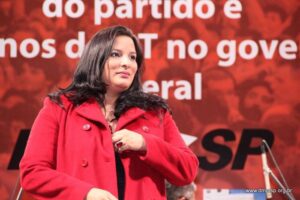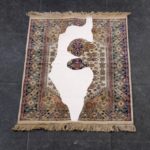Lula Must Save Brazil From Savage Capitalism, Says Federal Deputy Juliana Cardoso
No Comments yetJuliana Cardoso is sitting in her office in front of a lavender, orange, and yellow mandala that was made for her. She has been a member of São Paulo’s city council since 2008. On October 2, 2022, as a candidate for the Workers Party (PT), Cardoso won a seat in Brazil’s lower house, the Federal Chamber of Deputies.
She is wearing a t-shirt that bears the powerful slogan: O Brasil é terra indígena (Brazil is Indigenous land). The slogan echoes her brave campaign against the disregard shown by Jair Bolsonaro, Brazil’s 38th president defeated on October 30, towards the Indigenous populations of his country. In 2020, during the height of the pandemic, Bolsonaro vetoed Law no. 14021 which would have provided drinking water and basic medical materials to Indigenous communities. Several organizations took Bolsonaro to the International Criminal Court for this action.
In April 2022, Cardoso wrote that the rights of the Indigenous “did not come from the kindness of those in power, but from the struggles of Indigenous people over the centuries. Though guaranteed in the [1988] Constitution, these rights are threatened daily.” Her political work has been defined by her commitment to her own Indigenous heritage but also by her deep antipathy to the “savage capitalism” that has cannibalized her country.
Savage Capitalism
Bolsonaro had accelerated a project that Cardoso told us was an “avalanche of savage capitalism. It is a capitalism that kills, that destroys, that makes a lot of money for a few people.” The current beneficiaries of this capitalism refuse to recognize that the days of their unlimited profits are nearly over. These people—most of whom supported Bolsonaro—“live in a bubble of their own, with lots of money, with swimming pools.” Lula’s election victory on October 30 will not immediately halt their “politics of death,” but it has certainly opened a new possibility.
New studies about poverty in Brazil reveal startling facts. An FGV Social study from July 2022 found that almost 63 million Brazilians—30% of the country’s population—live below the poverty line (10 million Brazilians slipped below that line to join those in poverty between 2019 and 2021). The World Bank documented the spatial and racial divides of Brazil’s poverty: three in ten of Brazil’s poor are Afro-Brazilian women in urban areas, while three-quarters of children in poverty live in rural areas. President Bolsonaro’s policies of upward redistribution of wealth during the pandemic and after contributed to the overall poverty in the country and exacerbated the deep social inequalities of race and region that already existed. This, Cardoso says, is evidence of the “savage capitalism” that has gripped her country and left tens of millions of Brazilians in a “hole, with no hope of living.”
To Sow Hope
“I was born and raised within the PT,” she tells us, in the Sapopemba area of São Paulo. Surrounded by the struggles against “savage capitalism,” Cardoso was raised by parents who were active in the PT. “As a girl, I walked amongst those who built the PT, such as José Dirceu, José Genoino, President Lula himself,” as well as her mother—Ana Cardoso, who was one of the founders of the PT. Her parents—Ana Cardoso and Jonas “Juruna” Cardoso—were active in the struggles of the metalworkers and for public housing in the Fazenda da Juta area of Sapopemba. A few days after he led a protest in 1985, Juruna was shot to death by mysterious gunmen. Juliana had been sitting in his lap outside their modest home in the COHAB Teotônio Vilela. Her mother was told not to insist on an investigation, since this would “bring more deaths.” This history of struggle defines Juliana.
“We are not bureaucrats,” she told us. “We are militants.” People like her who will be in the Congress will “use the instrument of the mandate to move an agenda” to better the conditions of everyday life. Pointing to the mandala in her office, Juliana says, “I think this lilac part is my shyness.” Her active life in politics, she says, “kind of changed me from being shy to being much firmer.” There is only one reason “why I am here,” she says, and that is “to sow, to have hope for seeds that will fight with me for the working class, for women, during this difficult class struggle.”
Politics in Brazil is Violent
Lula will be sworn into office on January 1, 2023. He will face a Chamber of Deputies and a Senate that are in the grip of the right-wing. This is not a new phenomenon, although the centrão (centre), the opportunistic bloc in the parliament that has run things, will now have to work alongside far-right members of Bolsonaro’s movement. Juliana and her left allies will be in a minority. The right, she says, enters politics with no desire to open a dialogue about the future of Brazil. Many right-wing politicians are harsh, formed by fake news and a suffocating attitude to money and religion. “Hate, weapons, death”—these are the words that seem to define the right-wing in Brazil. It is because of them that politics “is very violent.”
Juliana entered politics through struggles developed by the Base Ecclesiastical Communities (CEBs) of the Catholic Church, learning her ethics through Liberation Theology through the work of Dom Paulo Evaristo Arns and Paulo Freire. “You have to engage people in their struggles, dialogue with them about their struggles,” she told us. This attitude to building struggles and dialoguing with anyone defines Juliana as she prepares to go to Brasilia and take her seat in the right-wing dominated National Congress.
Lula, Juliana says, “is an ace.” Few politicians have his capacity to dialogue with and convince others about the correctness of his positions. The left is weak in the National Congress, but it has the advantage of Lula. “President Lula will need to be the big star,” said Juliana. He will have to lead the charge to save Brazil from savage capitalism.
You May Also Like
Comments
Leave a Reply








